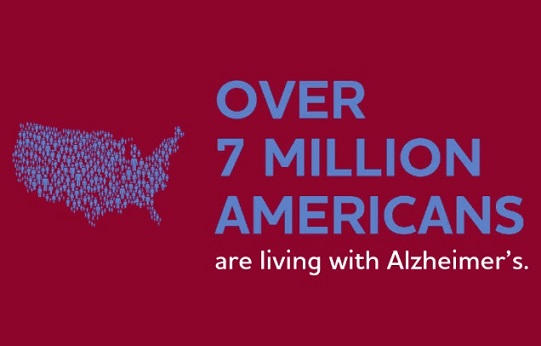U.S. Medical News: More Than 7.2 Million Americans Inflicted With Dementia Due to Alzheimer’s Disease!
Nikhil Prasad Fact checked by:Thailand Medical News Team May 03, 2025 9 months, 3 weeks, 23 hours, 17 minutes ago
U.S. Medical News: Alzheimer’s disease has reached staggering proportions in the United States, with a recent report from the Alzheimer’s Association estimating that approximately 7.2 million Americans aged 65 and older are currently living with Alzheimer’s dementia. This figure represents about 11 percent of all seniors in that age group and is expected to rise as the nation’s population ages. In addition to revealing these alarming numbers, the 2025 Alzheimer’s Disease Facts and Figures report sheds light on public attitudes toward early detection, caregiving burdens, treatment costs, and the need for earlier diagnosis.
 U.S. Medical News: More Than 7.2 Million Americans Inflicted With Dementia Due to Alzheimer’s Disease
U.S. Medical News: More Than 7.2 Million Americans Inflicted With Dementia Due to Alzheimer’s Disease
In a national survey conducted as part of the report, 99 percent of Americans emphasized the importance of diagnosing Alzheimer’s disease in its early stages. This
U.S. Medical News report highlights the significance of timely identification, explores new treatment avenues, and dives into what caregivers and health systems are facing across the country.
Why Early Diagnosis Matters
Alzheimer’s disease is progressive and often begins silently, with brain changes occurring 20 years or more before symptoms like memory loss and confusion emerge. Because of this long preclinical phase, early detection is vital. Detecting the disease in its earliest stages—when symptoms may be as subtle as difficulty concentrating or forgetfulness—can open the door to newer treatments that may slow disease progression. Medications like lecanemab and donanemab, which target amyloid plaques in the brain, are approved for use in people diagnosed with mild cognitive impairment (MCI) or early-stage Alzheimer’s dementia.
In fact, more than 90 percent of Americans expressed a desire to undergo a simple medical test to detect Alzheimer’s, with 91 percent preferring to do so before symptoms appear and 95 percent when early symptoms begin. These numbers reflect a growing awareness of the value of early intervention not only for medical care but also for personal and financial planning.
Caregiving and Economic Pressures
With the rise in Alzheimer’s cases comes a surge in caregiving needs. Over 11 million Americans provide unpaid care for people with dementia, often for extended periods and at great personal sacrifice. These caregivers provide nearly 18 billion hours of care each year, valued at more than $339 billion. The emotional, physical, and financial toll is immense. Many caregivers report high levels of stress, depression, and even declining physical health.
What makes caregiving even more challenging is the progressive nature of Alzheimer’s. In the early stages, individuals may need minimal help. But as the disease advances to moderate and severe stages, they may become entirely dependent for basic activities like eating, bathing, and mobility. This can lead to a n
eed for 24-hour supervision and increased health care expenses.
New Treatments Offer Hope but Are Not Cures
New anti-amyloid drugs like lecanemab (Leqembi) and donanemab (Kisunla) mark a turning point in the fight against Alzheimer’s. These treatments, approved for individuals in the early stages, work by reducing beta-amyloid deposits in the brain, a hallmark of Alzheimer’s disease. While not a cure, these drugs can slow cognitive decline in some individuals, potentially allowing more time for independence and planning.
However, these medications come with limitations and risks. Side effects such as brain swelling and bleeding (known as ARIA) have been documented, and the drugs are not suitable for individuals with advanced disease. Additionally, treatment access is limited due to high costs, the need for specialized diagnostic imaging, and insurance barriers.
Public Sentiment and Future Outlook
The Alzheimer’s Association report reveals overwhelming public support for routine cognitive screening as part of preventive health care, with 59 percent of Americans advocating for it. Yet, despite strong interest, early diagnosis remains underutilized, and many individuals are not diagnosed until the disease has significantly progressed.
Experts agree that improving education, expanding access to diagnostic tools such as blood-based biomarker tests, and ensuring equitable access to emerging treatments are critical next steps. Policymakers, health care providers, and communities must work together to meet this growing health crisis head-on.
Conclusion
Alzheimer’s disease is not only a medical condition—it is a societal challenge affecting millions of families across the United States. The 2025 Alzheimer’s Disease Facts and Figures report illustrates the scale of the problem and the urgent need for early detection, better treatment access, and robust caregiver support. With nearly all Americans in favor of early testing and treatment, there is strong public will to combat this devastating illness. As research advances and new therapies emerge, there is hope on the horizon. However, without systemic changes in how Alzheimer’s is diagnosed and treated, the burden will only continue to grow for patients, caregivers, and the health care system.
Reference:
https://www.alz.org/alzheimers-dementia/facts-figures
For the latest on
U.S. Medical News, keep on logging to Thailand Medical News.
Read Also:
https://www.thailandmedical.news/news/canadian-study-finds-that-alzheimer-drug-leqembi-may-work-less-effectively-in-women-than-men
https://www.thailandmedical.news/news/new-hope-for-alzheimer-s-disease-treatment-targeting-cerebrovascular-protein
https://www.thailandmedical.news/news/new-path-to-combat-alzheimer-s-unveiled-by-cholesterol-research
https://www.thailandmedical.news/news/breaking-harvard-scientists-find-that-alzheimer-is-driven-by-a-hidden-protein-fragment-and-not-amyloid-beta
https://www.thailandmedical.news/pages/thailand_doctors_listings
https://www.thailandmedical.news/articles/alzheimer,-dementia-
